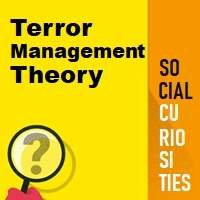
What is Terror Management Theory
The focus of Terror Management Theory (TMT) research is to know how fear of death influences human thinking and behavior. TMT is a theory of social and evolutionary psychology originally proposed by Jeff Greenberg, Sheldon Solomon, and Tom Pyszczynski.
According to TMT, death anxiety drives people to adopt worldviews that protect their self-esteem, worthiness, and sustainability and allow them to believe that they play an important role in a meaningful world.
According to TMT, people need to insulate themselves from their deep fear of living an insignificant life destined to be erased by death. This conflict produces terror, which is managed through a combination of escapism and cultural beliefs that act to counter biological reality with more significant and enduring forms of meaning and value
One path to address this fear is to assure themselves that they are part of an important group.
This desire to reinforce cultural significance in the face of death often results in displays of prejudice based on the belief that the group with which one identifies is superior to others. In this way, people confirm their self-importance, at least to themselves.
TMT proposes that individuals are motivated to develop close relationships within their own cultural group in order to convince themselves that they will somehow live on—if only symbolically—after their inevitable death. While some of the foundational studies on which TMT is based have failed to replicate, thereby drawing criticism within the field of psychology, the framework continues to resonate for many.
The most obvious examples
The most obvious examples of cultural values that assuage death anxiety are those that purport to offer literal immortality (e.g. belief in the afterlife through religion).
However, TMT also argues that other cultural values – including those that are seemingly unrelated to death – offer symbolic immortality. For example, values of national identity, posterity, cultural perspectives on sex, and human superiority over animals have been linked to calming death concerns.
In many cases these values are thought to offer symbolic immortality, by either a) providing the sense that one is part of something greater that will ultimately outlive the individual (e.g. country, lineage, species), or b) making one’s symbolic identity superior to biological nature (i.e. you are a personality, which makes you more than a glob of cells).
Because cultural values influence what is meaningful, they are foundational for self-esteem. TMT describes self-esteem as being the personal, subjective measure of how well an individual is living up to their cultural values.


